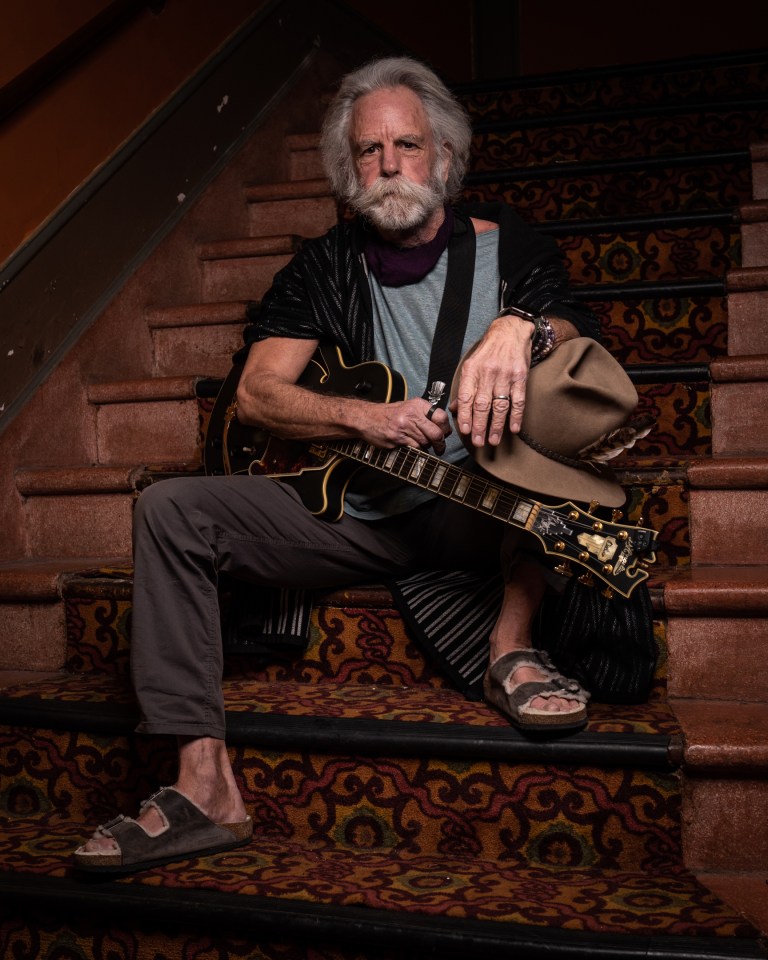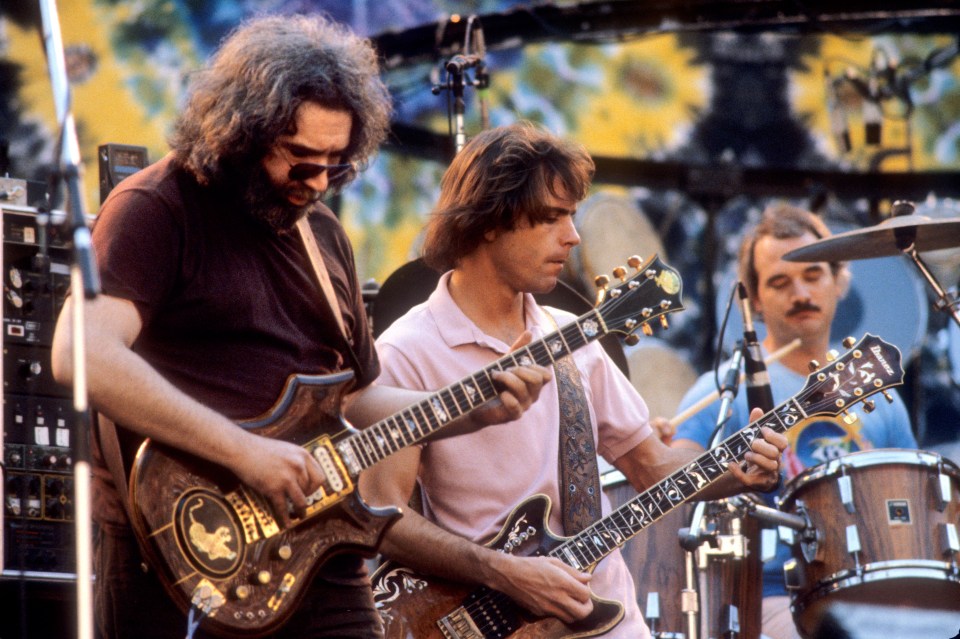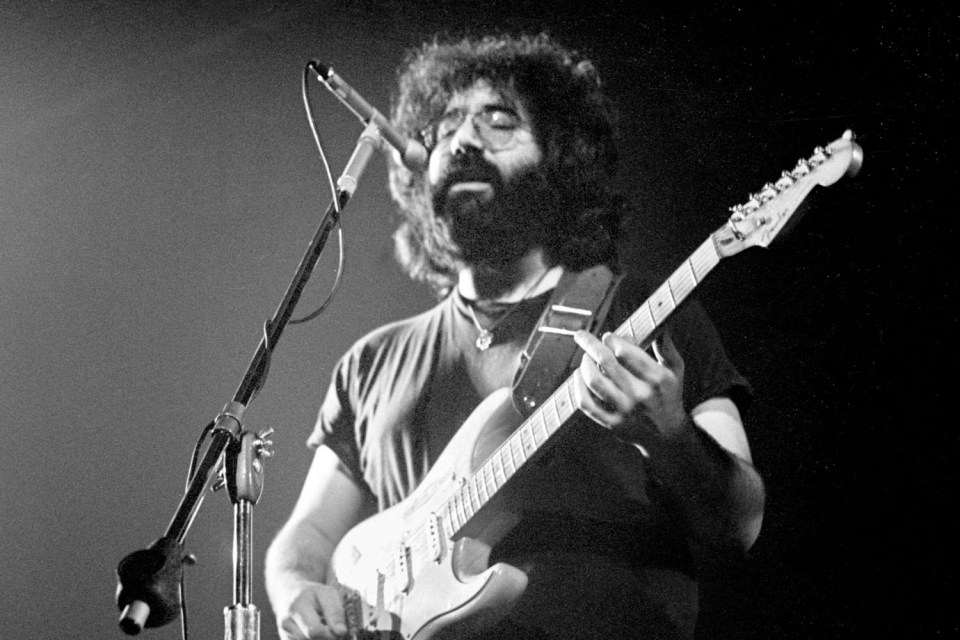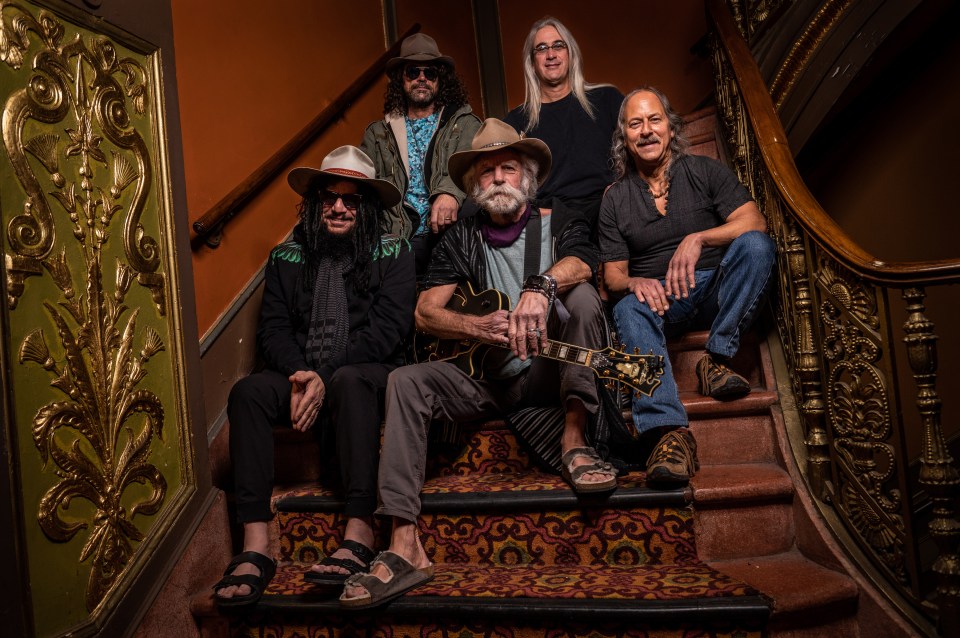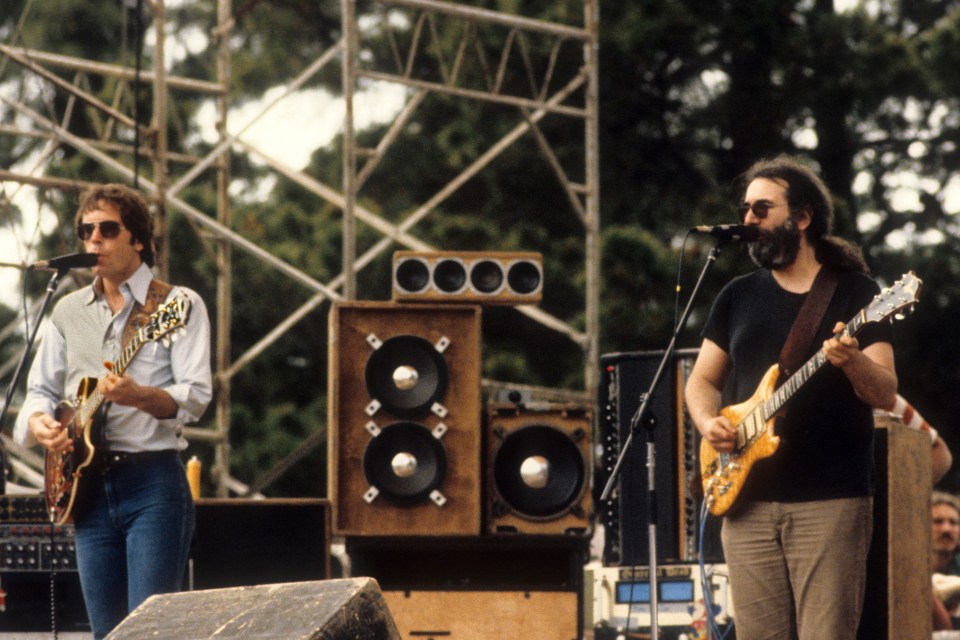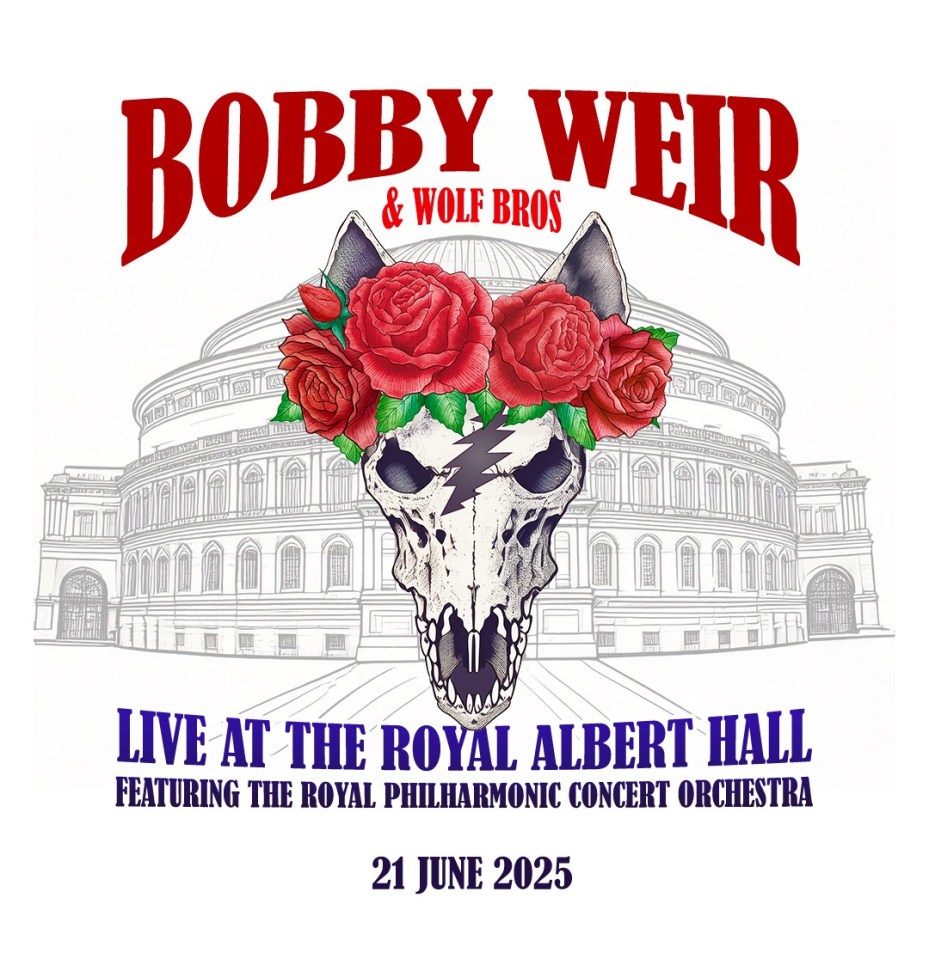“What a long, strange trip it’s been” for the Grateful Dead’s Bob Weir – or Bobby Weir, as he goes by these days.
As Deadheads among you will know, that immortal line comes from one of their best loved songs, Truckin’.
A Weir co-write with Jerry Garcia, Phil Lesh and lyricist Robert Hunter, the bluesy, steady-rolling shuffle has been recognised by the United States Library Of Congress as “a national treasure”.
The same accolade applies to Weir himself. It was he who took lead vocals on the song which references a drugs raid at the band’s hotel on Bourbon Street, New Orleans, in 1970.
At 77, he is chief keeper of the Dead’s flame, performing their music as leader of two bands, Dead & Company and Bobby Weir & Wolf Bros.
It is the second of these offshoots that us British Deadheads (yes, I count myself among them) are getting excited about.
On June 21, Weir is heading to the UK for the first time in 22 years, the last time being with another of his post-Dead bands, RatDog.
He and Wolf Bros — Don Was (bass), Jeff Chimenti (piano) and Jay Lane (drums) — are taking to the Royal Albert Hall’s hallowed stage with the 68-piece Royal Philharmonic Concert Orchestra.
They will present reimagined songs from what Weir describes as “the Dead songbook” and a sprinkling of compositions from his solo career.
And that’s the reason why I’m on a video call to one of America’s most intriguing and long-serving musicians.
It’s a fine spring evening in London and an equally balmy lunchtime on the West Coast, where a clear blue sky frames Weir’s distinctive, distinguished features.
‘A sense of being’
His swept-back grey/white hair with matching walrus moustache and beard, as well as his piercing brown eyes, give him the air of one of rock’s elder statesman.
But, before we get stuck into his symphonic London show, it’s time for a Grateful Dead recap.
It’s important to note that they were not just a band but also a way of life.
They fostered unrivalled community spirit, putting themselves and the original Deadheads at the forefront of the counterculture movement in the late Sixties.
They were a rallying point for all those pot-smoking folks with tie-dyed clothes, beaded necklaces, sandals and long hair. They were — to borrow hippie parlance — far out, man!
When I first heard rock and roll, I realised I had something of a calling. I was seven, eight, nine years old when Elvis Presley was a big star. He had an energy about him that I related to.
Being part of a giant family gave the Dead “a sense of being and a sense of purpose”, decides Weir.
At just 16, he had hooked up with Jerry Garcia, five years his senior, in the Californian city of Palo Alto to become the Dead’s youngest founder member, beginning his “long strange trip” playing the band’s music.
“Number one, it’s the only thing I’m equipped to do,” he tells me, choosing his words carefully. “I’m dyslexic in the extreme, so an academic career was never a move on the board for me.
“When I first heard rock and roll, I realised I had something of a calling.
“I was seven, eight, nine years old when Elvis Presley was a big star. He had an energy about him that I related to.
“Soon, there was only one thing I was really interested in — making that kind of music.”
Weir says the arrival in the US of The Beatles, as leaders of the “British Invasion”, also had a profound effect.
“The Beatles looked like they were having a lot of fun — they were bright, they worked well together and their music reflected that.
“It’s pretty apparent that in three or four hundred years, people will still be talking about them. Maybe if we [the Grateful Dead] are lucky, we’ll also make that cut!”
Weir’s imposing rock vocals and richly textured rhythm guitar provided the perfect foil to Garcia’s ethereal delivery and intricate lead guitar.
They conjured up a transcendent fusion of rock, country, jazz, gospel, ragtime, you name it, and were masters of improvisation on extended jams involving tracks such as the epic Dark Star.
Today, Weir admits that never a day goes by when he doesn’t think about Garcia, who died in 1995 aged 53, effectively ending the Grateful Dead (if not live performance of their music).
“Jerry and I were soulmates,” he says. “I did stuff that he didn’t do and he did stuff that I didn’t do. We relied on each other.
“The whole deal was that we would keep doing it for as long as we were having fun — and we did.”
Weir also has bassist Phil Lesh on his mind, a fellow founder member who died last October aged 84.
Back in the day, when we were playing these songs, this [orchestrated sound] is basically what was going on in our heads.
“I’ve thought about him a lot lately and I haven’t come up with any greater clarity other than he was a friend of mine — he taught me a lot and I like to think I taught him a lot.
“He was a musical mentor but, at the same time, my way was not his way. I had to sort the catfish from the trout, as they say, when ideas came up.
“Now, I’m just going to let that all pass.”
It’s a full 60 years since The Grateful Dead formed and 30 since Garcia’s death but Weir is still pushing on by bringing his special concert to the Albert Hall, a venue he’s never played before.
“I’ve only heard about it in songs but I’m looking forward to it for sure,” he says, surely in reference to The Beatles’ A Day In Life with its line, “now they know how many holes it takes to fill the Albert Hall”.
The event follows similar outings by Weir in the States and he believes the addition of a full orchestra is not as strange as it seems.
“Back in the day, when we were playing these songs, this [orchestrated sound] is basically what was going on in our heads,” he says.
“We were hearing a much fuller representation than our instruments allowed us to play.
“So, we imagined how songs could sound and we reached for those timbres. This is an opportunity to actually do it.”
For an artist so defined by improvisation, I’m intrigued by the prospect of him playing with an orchestra and all the attendant constraints.
When I mention this, Weir latches on to the theme and says: “This is the point I wanted you to remind me of.
“Right now, we have to stick to a given arrangement. What’s on the paper is what’s going to get played BUT that’s not where we’re taking this.
“What’s afoot is trying to get it so the orchestra can improvise relatively freely.”
‘I’ll need 100 iPads’
Weir explains his plans for a team of “improv leaders” sorted into “various sections of the orchestra with a multiple choice of riffs”.
“I’m probably going to need Apple to give me a hundred iPads to make it work,” he adds with a wry smile.
“But if it works for us, it will work for any of the composers. I’m thinking of Beethoven’s Ninth Symphony — the start of the second movement. You could employ this kind of thing until hell won’t have it no more!”
Weir returns to matters in hand, namely the Albert Hall show and what the audience can expect — ie the unexpected as is the Grateful Dead way.
He says: “We’ve got a couple of dozen songs orchestrated. Right now, it comes out at roughly five and a half hours of music. We’re already at the point where you don’t know what you’re going to hear.
“That’s how we’ve done things all along and that’s how I intend to go on. That said, there will be new additions for the London performance because they’re up and ready.”
Weir senses that his audience will be open-minded about orchestral arrangements and prepared to “get with it” on this latest sonic adventure.
“This is for the folks who want to hear something that’s a step beyond where it’s been — and this is surely that!” he exclaims.
So, are we likely to see the cosmic Dark Star, which once ran to 43 minutes but usually clocks in at about 20.
“Dark Star is orchestrated,” replies Weir. “I won’t say I’m taking requests but I’ll take it into consideration. We haven’t got there with the setlist yet.”
When I was 15, I decided on a terribly romantic thing to do — run off and be a cowboy.
I guess we’ll have to wait and see if he’ll play his most cherished Dead co-writes — Sugar Magnolia, Playing In The Band, Estimated Prophet, Hell In A Bucket, Throwing Stones or, of course, Truckin’.
While Garcia forged an intuitive songwriting partnership with Robert Hunter, yielding Uncle John’s Band, Ripple, Stella Blue and other classics, Weir fell out with Hunter when creating crowd pleaser One More Saturday Night.
He confesses: “There was a lot of tension because I write lyrics too and Hunter was not real good with that. He liked to play it closer to the vest.”
So Weir turned to his pal, the late John Barlow, for collaborations. “Barlow and I went to school together,” he says. “We grew up together.
“When I was 15, I decided on a terribly romantic thing to do — run off and be a cowboy.
“I worked on Barlow’s parents’ ranch in Wyoming. Over the years, we would live out there in a little log cabin and write.
“And I’ll tell you this — we’re just starting to crack the nut on some of our compositions with the orchestral work.”
In this free-ranging interview, full of unexpected twists and turns, a bit like a Grateful Dead live set, I ask Weir about his early visits to England.
He recalls the 1972 Bickershaw Festival, near Wigan, a doomed venture partly organised by late TV host Jeremy Beadle.
The Dead played a five-hour set to the mud-covered crowd and Weir says: “I remember it well. It was a rainy occasion!”
During that tour of Europe, they also did two nights at Wembley Arena (then called Empire Pool) and a four-night stand at London’s Lyceum.
Weir says they were a band at the peak of its powers, celebrated by the live triple album, Europe ’72.
“We were young and strong but jet lag was a serious business,” he adds. “We took it into consideration in ’72 and held off for a few days.
“But we were in a phase when the band was high and we delivered the goods.”
This year, Weir has also been delivering for Dead & Company (with John Mayer on lead guitar) at the state-of-the-art Sphere in Las Vegas.
The venue projects moving images on to the inside of the huge spherical auditorium but, says Weir, it’s still not fully prepared for the Dead’s freewheeling attitude.
“Mind-blowing as it is, it’s still a work in progress because a great deal of technological development needs to be done before content people can be faster on their feet.
“When that work is done, it’s going to surpass opera in terms of what you can deliver from one stage.”
As for this restless soul Weir, he believes that his musical journey is only just “coming to fruition”.
“It’s been complicated so it was always going to take a while,” he admits. “I’m not sure I totally understand what it is that I’m up to but I have a handle on it now to take the next steps forward.”
It seems that this line from Truckin’ could have been written for Bobby Weir.
“Sometimes the light’s all shinin’ on me.”
